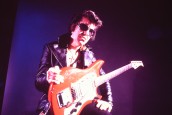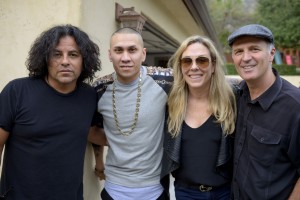
The team behind RUMBLE: Stevie Salas (Executive Producer), Taboo (of the Black Eyed Peas),
Catherine Bainbridge (Director/Producer/Writer) and Alfonso Maiorana (Co-director/
Writer) | photo by Chris Rutkowski
RUMBLE: THE INDIANS WHO ROCKED THE WORLD is a documentary chronicling the influence of Native Americans on rock ‘n’ roll and other musical forms throughout history. The film has shown at festivals and special engagements throughout the world. On Monday, January 21, it will make its PBS debut.
Famed guitarist Stevie Salas is one of RUMBLE’s executive producers who got the project in motion. Taboo (birth name Jaime Gomez), of the Black Eyed Peas is partially of Native American descent and one of the musicians interviewed in the film. The two men have known each other a long time, and comfortably sit together for an in-depth discussion of RUMBLE, and the impact that the music it chronicles has had on their own lives and work.
ASSIGNMENT X: How did the two of you find one another to begin with? Did you meet through the music scene, or some other way?
STEVIE SALAS: It was kind of through the music scene in a roundabout way, because the Black Eyed Peas – I am older than Tab, and so I started about ten years before him, and I have a recording contract. A young kid used to come and stand right in front of me, right before I blew up, but I was already signed, I played clubs still, and he used to come and watch me, every time I played. And I got to know him, just this nice kid. And it turns out, years later, he became the guitar player for the Black Eyed Peas. So he would write me and tell me, “I’m in this band.” So I’d pop into little clubs and see him play, just say hi to him, check on him. And then I went to put this exhibit together for the Smithsonian on the subject of RUMBLE. It was called UP WHERE WE BELONG: NATIVES IN POPULAR CULTURE. And I asked [another musician], “Is Taboo Native American?” I’d been hearing he was. You used to hear all kinds of things about Taboo.
[Taboo laughs.]
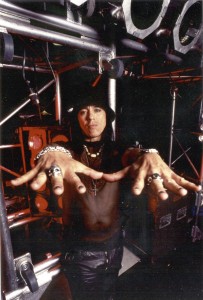
Heavy metal drummer Randy Castillo, one of the Native American musicians profiled in RUMBLE | Photo Courtesy of Christine Castillo, Randy Castillo Foundation
SALAS: You didn’t know – they’d say he was from the Philippines –
TABOO: Asian guy, Japanese guy –
SALAS: All these things. But I’d heard he was a Native American, too. So I asked. He goes, “Yeah.” And I go, “I’m doing this thing. I’d love to talk to him.” And they wrote me right back. “Man, Tab wants to talk to you. He’s been really wanting to talk to somebody about his Native American heritage.” I’m a lot like Taboo – I’m no expert, I was just on a long learning adventure, my whole life, really, and Tab was, too. So we got hold of each other, and then this thing just kept snowballing and snowballing, and then we made a film. I’m old now, right? So having a younger guy who reached a younger group of people, was an amazing thing to have, because all the other people we were talking about were very old, or already passed away. So it was really great having Taboo around, because he’s a great ambassador, and young people really react to him.
TABOO: And, to just interject on that, he also served as a mentor, because he had been in the music industry and met a lot of great artists, but also, he has his imprint in a lot of Native work, whether it’s philanthropy, or being an inspiration to our communities. So I said, “Hey, Stevie, I want to learn more, I want you to connect me with other people, other like-minded Natives,” and [addressing Salas] I always hold the relationship between you and I very dear, because he was one of the first people with status to be able to inspire me to be of service to our community. Because a lot of times, you forget about where you come from. But he never forgot. And he’s still educating himself. And we always say, we are vulnerable enough to say, we don’t know everything about being Native, but along the way, we are educating ourselves, and trying to become inspirational figures to the Native community.
AX: Do you know which nations you’re from?
SALAS: I’m an Apache. My mother came from the Chiricahua side, and my father from the Mescalero side.
TABOO: I’m Shoshone on my grandmother’s side, and Hopi, and then on my grandfather’s side, I’m Mexicano, or Mexican.
SALAS: The thing about Tab and I is that, I grew up surfing. My father ran away from Wyoming when he was seventeen, and fought in the Korean War and ended up in Camp Pendleton. I was born in San Diego. So I spent my life surfing, and playing guitar, and I knew who I was as a Native American person, but I didn’t live any of that lifestyle. It was like, it never held me back. And I grew up never thinking I was different than anybody else. And then once I started going into Indian country, that’s when I realized, a lot of the kids on the res didn’t have that same outlook I had, or maybe that Tab had. It didn’t seem like there was anything I couldn’t do if I really wanted to, the way I was brought up. Tab’s really inspiring when he speaks and talks with the kids. I try to set by example. I play with Mick Jagger, I play with the biggest people in the world. Tab’s sold sixty million records. We try to say, if we can do it, anybody can do it. But it’s still – you’ve got to go down there and get your hands in the dirt. And in turn, they teach us a lot.
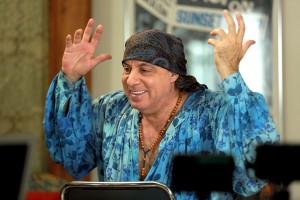
Steven Van Zandt, member of Bruce Springsteen’s E Street Band and featured in RUMBLE | Photo Courtesy of Rezolution Pictures
AX: Now, were you always aware of the influence of Native American music on rock ‘n’ roll, or was that something you discovered once you started creating your own music that this was the forebear, or when did you learn about this?
TABOO: Honestly, I was not aware, because like I’m still learning myself, I’m still educating myself, and when I watched RUMBLE, I learned about Jimi Hendrix. I knew there were similarities, because of the way that he dressed, and just the cheekbones, and there was a similarity to the persona and the aura that he had, and it was very informative when I watched RUMBLE, and I learned about that, and I learned about the people in New Orleans, and how blues and Charley Patton and all these people, who were so influential as Native folks, what they did for the entertainment industry, and for the music industry.
SALAS: Let me just tell you how much I did know. I got out of high school. My first band I joined was Rod Stewart. I’m reading, saying to myself, “I can’t be the only Native American guitar player playing Madison Square Garden,” and I’m searching, just as a hobby, and I’m reading about this guy, Jesse Ed Davis, since I was in sixth grade, reading his name on albums. I’m playing his guitar parts, because he used to play with Rod Stewart, too. I’m playing his guitar parts. Here I am, searching for Native Americans, not knowing that I’ve actually been knowing about him forever. I just didn’t know Jesse Ed Davis was a Native American. I’d read his name on liner notes. I’m playing his guitar parts, too. Didn’t know he was a Native American. So the whole thing was news to a lot of people.
AX: To ask about the title, I understand that “Indians” can be an offensive term, so why “Indians,” rather than Native Americans?
SALAS: It’s good you asked that question. Because it [“Native Americans”] didn’t sound rock. We had this discussion – I went to make the film with Resolution Pictures, and I was speaking to Christina Fon about it, my producing partner. We had this discussion. I said, “We’re going to catch some heck from somebody about that.” And we really thought about it. We thought, “The really most important thing is not to make a film that people don’t get.” So we needed a title that said it, so people around the world would identify us as Indians. “Red Indians,” they say in Europe.
AX: The other thing is, are you concerned that anybody might think that this is about rock ‘n’ roll from India?
SALAS: Well, that happened. We had a problem with our Australian distributor. He called us and said, “We have a real problem. Can we change the title down here, because everyone thinks it’s a story about a group from India that want to play rock ‘n’ roll. They have no idea what it’s about.” [laughs] So we had our issues with that. But in America, we thought that it was better to have a bigger buzz, and get more people to see the film, than worry about if we called it THE ABORIGINALS – because in Canada, they [Native Americans] are called Aboriginals – THE NATIVE AMERICANS WHO ROCKED THE WORLD? We needed it to still have some zip, and we wanted it to be a mainstream film. So we took a chance that we were going to take a little heat on that, and it hasn’t been too bad.
AX: And the RUMBLE part of the title, is that “rumble” like conflict, or the beginning of an earthquake?
SALAS: It’s Link Wray. Link Wray is the beginning of an earthquake, and conflict, and all of that, so yes and no. Because Link Wray creates the song “Rumble” in 1957, ’58, and he creates the power chord, he creates distorted guitar, he creates this attitude in rock ‘n’ roll. It’s the Big Bang and birth of rock ‘n’ roll. He’s right there with Elvis, and he’s right there with Bill Haley, and Little Richard, and we wanted to make a rock ‘n’ roll film. Even though we go farther back, that was sort of our center point, is the birth of rock, which leads us to Redbone and the Black Eyed Peas and Randy Castillo and all the different people.
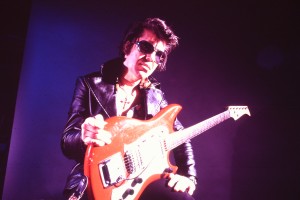
Rock guitar legend Link Wray (Shawnee), one of the Native American
musicians profiled in RUMBLE. Circa 1970s | Photo by Bruce Steinberg, courtesy of LinkWray.com
AX: With Link Wray, why is he not as well-known as Elvis or Little Richard? Is it because there was a bigger effort to sweep Native Americans under the carpet, or was he just not as good at self-publicity?
SALAS: I think the real underlying story of RUMBLE is, nobody wanted to claim they were Native Americans. So my birth certificate – it’s pretty funny, actually, I put it on Facebook – and I said, “Hey, everybody, I found out some crazy news. I might be white.” Because my birth certificate says my mom and my dad are both white. And I asked them, why did they do that? And they said, “Well, we thought that might give you a better shot at life, a better chance.” And so my great-grandparents – nobody wanted to claim they were Native. They were better off – if you were Hispanic, or if you were from Spain, or you were Castilian, or you were Mexican, you could stay and farm. But if you were a Native American, you were going to get shipped off, or your family was, or you were going to get shot. So a lot of people grew up not even knowing who they were. Jeff Beck and Jimmy Page are two of the most famous guitar players who ever lived. Huge fans of Link Wray. Jeff Beck is a huge fan of Native American culture. He was telling me all these great Link Wray stories about him playing air guitar with Jimmy Page when he was seventeen, and when I told him [Wray] was a Native American, he flipped out. He didn’t even know, and I thought he always knew. So it was kind of a secret. It wasn’t something that people talked about back then.
AX: What was your role in making RUMBLE? Was it just getting it together, was it finding people to interview …?
SALAS: We have two directors [Catherine Bainbridge and Alfonso Maiorana], and I was sort of the overseer/creative person, because I brought the story to make the film. And my job, for me personally, was to not make a race film, not make a negative film. I didn’t want to make a film that said, “You stole our music, you stole our land, you screwed us again.” I didn’t want to make that film. I wanted to make a story about heroes. I noticed when I traveled in Indian country, there was a lack of modern role models, not ones from a hundred years ago, but like right now, here and now. And I go, “Well, you’ve got a whole bunch of them right here that nobody knows about.” And realistically, when we first talked with Resolution Pictures about making the film, we wanted to make a film for PBS that taught history and showed Native American people they had some amazing role models. That was really the goal. We had no idea it was going to turn into this massive thing it turned into globally like it has. And it’s actually changed written history now. Now RUMBLE has been turned into a school curriculum, and it’s being taught in schools, and kids are taking history tests. People post it on Facebook – “Look at my test today!” It’s about RUMBLE. It’s crazy what’s going on.
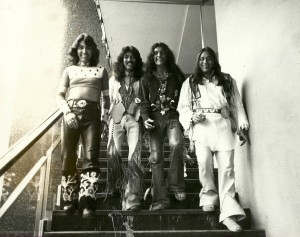
Pat Vegas and members of the Native American rock group are featured in RUMBLE: Photo Credit: Joseph Dominguez
TABOO: And as far as what I contributed, it all started with the Smithsonian, the exhibit, when [Salas] came to me and said, “This exhibit is about musicians and Natives that have affected change in pop culture and music.” And when he told me about RUMBLE, I was like, “Man, I want to continue what we started with the Smithsonian.” [In RUMBLE], I got to talk a little bit about my grandmother, who was my biggest influence, the reason why I’m here today, the reason why I was in entertainment, why I chose music as my journey. And then at the end, I got to showcase a song I did for Standing Rock [the sustained protest against the Keystone XL pipeline on Native American land], which is kind of the turning point in my journey, to really be of service and to help Indian country as much as possible with support. We did Standing Rock and then all the stuff that I’ve been doing with philanthropy, especially for Native youth, at risk, because the suicide rate is so high. Standing Rock was the thing that led me to be able to do all this other stuff. But if it wasn’t for him saying, “Tab, be part of this,” I probably would not have skewed this way as much, because I needed this to kind of understand my journey.
This interview was conducted during PBS’s portion of the Television Critics Association (TCA) press tour.
PART 2 – TOMORROW
Follow us on Twitter at ASSIGNMENT X
Like us on Facebook at ASSIGNMENT X
Article Source: Assignment X
Article: RUMBLE: THE INDIANS WHO ROCKED THE WORLD – Part 1 interview with Executive producer Stevie Salas and Taboo of the Black Eyed Peas – Exclusive Interview
Related Posts:




